As we rush through our daily lives, we often forget about something very important: staying hydrated. We might wake up thirsty, but then we get busy and forget to drink water. Our bodies are made up of about 50% to 70% water1.
It’s surprising how easily we can forget to drink water, even when our bodies are crying out for it. Drinking enough water is not just about carrying a water bottle. It’s about understanding how water affects our health. Not drinking enough water can lead to serious health problems like heart failure and diabetes, which are common in middle-aged people2.
Our bodies send us signals when we need water. Paying attention to these signs can greatly improve our health and well-being.
Key Takeaways
- Hydration is crucial since about 50% to 70% of our body weight is water.
- Men should aim for approximately 15.5 cups (3.7 liters) of fluids daily, while women should target about 11.5 cups (2.7 liters)1.
- Inadequate hydration can lead to chronic diseases and increased mortality rates2.
- Signs of dehydration include thirst, headaches, and darker urine2.
- Pregnant or breastfeeding women require additional fluids beyond standard recommendations.
Understanding Hydration: What Does It Mean?
Hydration means making sure our bodies get enough fluids to work right. It helps with digestion, blood flow, and keeping our body temperature stable. The hydration definition isn’t just about drinking water. It also includes eating foods that are full of moisture.
Keeping our bodies hydrated is key for our health. The importance for hydration is huge. Drinking enough water helps avoid dehydration, which can cause tiredness, headaches, and confusion3. Adults should drink about 3.7 liters for men and 2.7 liters for women each day. This shows how much water we need at different ages34.
Drinking fluids and eating the right foods help keep us hydrated. For example, fruits and veggies, which are mostly water, make up a big part of our daily water intake5. Listening to our body’s signs, like the color of our urine, helps us know if we’re drinking enough water. If our urine is pale straw, we’re good. But if it’s darker, we need to drink more4.
| Food Item | Water Content (%) |
|---|---|
| Fat-free milk | 90–99% |
| Cantaloupe | 90–99% |
| Strawberries | 90–99% |
| Watermelon | 90–99% |
| Lettuce | 90–99% |
| Carrots (cooked) | 80–89% |
| Broccoli (cooked) | 80–89% |
| Bananas | 70–79% |
| Rice (cooked) | 60–69% |
The Role of Water in the Body
Water is key to our health, making up about 60% of our body weight6. It’s not just for drinking; it’s vital for many body functions. This liquid helps our body work right.
Water as a Chemical Component
Water is crucial in our bodies. It helps with life’s basic needs, like blood flow7. It also helps move nutrients and get rid of waste.
Water’s Role in Cellular Function
Cells need water to stay healthy and work well6. It helps nutrients get to where they need to go. Without enough water, cells can get damaged, leading to serious problems8.
The Importance for Hydration: Why We Need It
Drinking enough water is key to our health. It helps prevent dehydration, which happens when we lose more water than we take in. Signs of dehydration include feeling tired and dizzy. So, it’s important to know these signs to keep our bodies hydrated5.
Preventing Dehydration
It’s important to drink enough water to avoid dehydration. Adults need about 1.5–2 litres of water each day. This is like 8-10 drinks, assuming each drink is 200 millilitres. Kids should drink 6-8 drinks a day to stay hydrated.
Newborns have more water in their bodies than adults, while older people have less. This shows we need to drink the right amount based on our age4.
Hydration for Energy and Efficiency
Drinking enough water boosts our energy. It helps us perform better physically and mentally. Athletes use special drinks to replace lost water and salts during hard workouts.
These drinks are needed because athletes lose a lot of water when they exercise4.
Contributing to Overall Health
Drinking water is good for our health in many ways. It helps with digestion, keeps our body temperature right, and keeps our joints moving smoothly. It also helps our immune system fight off sicknesses.
Drinking water from food is also important. Fruits and veggies are full of water, helping us stay hydrated4.
How Much Water Should You Really Be Drinking?
Knowing how much water we need is key to staying healthy. Experts say we should drink about 6 to 8 cups (48 to 64 ounces) of water each day. This advice comes from the Eatwell Guide9 and other health sources10. Water is the best drink for staying hydrated.
Drinking water regularly helps keep us hydrated. Signs of dehydration include dry mouth, feeling tired, and dark urine. These signs show why drinking enough water is important10.
Some groups need more water than others. Pregnant or breastfeeding women, for example, need more water to support their health and their babies’ growth10. It’s also good to limit sugary drinks like fruit juices and soda. Water is the best choice for staying hydrated9.
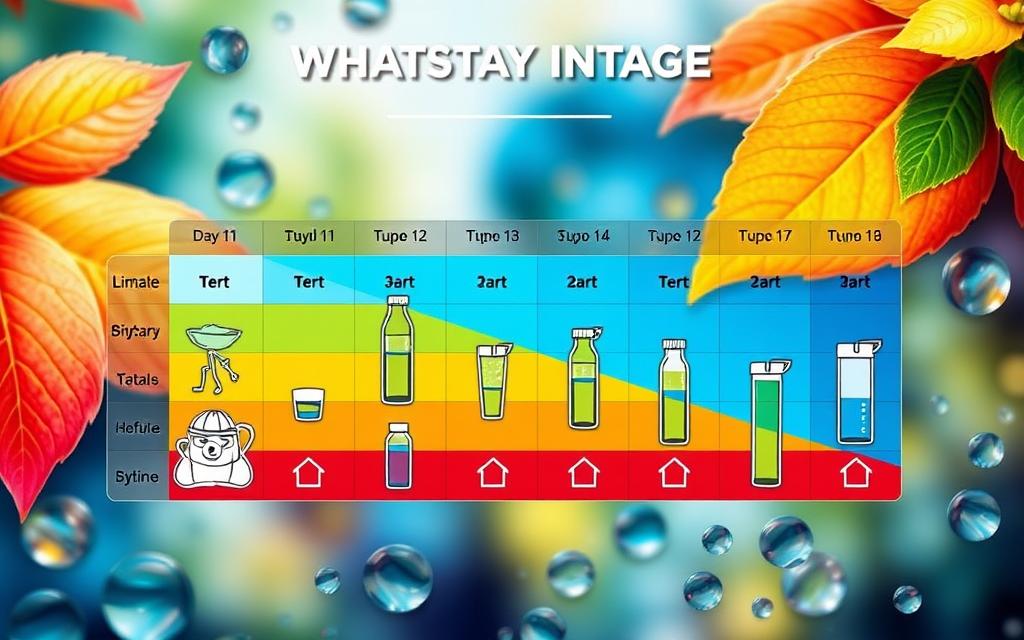
| Group | Daily Fluid Intake Recommendation |
|---|---|
| Adults (Men) | 15.5 cups (3.7 liters) |
| Adults (Women) | 11.5 cups (2.7 liters) |
| Children | 6 to 8 cups |
| Pregnant Women | Increased intake needed |
| Breastfeeding Women | Increased intake needed |
Drinking enough water helps our bodies work right. By focusing on water, we can improve our health and stay hydrated.
Factors Influencing Daily Water Needs
Our need for water changes based on several key factors. These include the climate, how active we are, and our health. Knowing these helps us stay hydrated.
Climate and Temperature Effects
In hot or humid places, we lose more water through sweat. This means we need to drink more to stay hydrated. About 75% of Americans struggle with dehydration, showing how important it is to drink the right amount based on the weather11.
The National Academies suggest drinking 2.7 to 3.7 liters of water daily in mild climates. This helps keep us hydrated12.
Impact of Physical Activity
Being active changes how much water we need. Before exercise, we should drink 14-22 ounces of water 2-3 hours ahead. Then, another 5-10 ounces half an hour before intense activities12.
During hard workouts, we lose about 1.5 grams of salt for every kilo of sweat. This increases our need for water, showing why drinking before exercise is crucial12.
Medical Conditions and Water Intake
Some health issues affect how much water we need. For example, diets high in protein or too much caffeine or alcohol can increase our fluid needs11. Hormonal changes during the menstrual cycle can also lead to dehydration, affecting our health11.
| Factor | Impact on Hydration | Recommendations |
|---|---|---|
| Climate | Increased sweat loss, higher fluid needs | 2.7-3.7 L fluids per day |
| Physical Activity | Higher perspiration, significant fluid loss | 14-22 ounces 2-3 hours before exercise |
| Medical Conditions | Condition-specific hydration needs, may require increased intake | Monitor intake based on health status |
Knowing these factors helps us make better choices about drinking water. This supports our health and well-being1211.
Debunking the 8 Glasses a Day Myth
The idea that we need to drink eight glasses of water a day is common. But, this eight glasses of water misconception makes hydration seem simpler than it is. The U.S. National Academies of Sciences, Engineering, and Medicine suggest adults drink between 92 to 124 ounces of water daily. They note that our needs vary based on many factors13.
The US Food and Nutrition Board advised drinking about 2.5 liters of water a day in 1945. This shows how different our hydration needs can be14.
Our bodies lose about 1.5 to 2 liters of water each day. This loss comes from breathing and sweating14. Physical activity or hot weather can increase this loss. For example, losing a pound while exercising means we need an extra 24 ounces of water to recover13.
It’s important to listen to our body’s thirst signals. Not drinking enough water can lead to dehydration13.
Stories of water intoxication show the importance of finding the right balance in water intake. Drinking too much water too fast can be dangerous13. By understanding our hydration needs and listening to our body, we can overcome these myths and stay healthy.
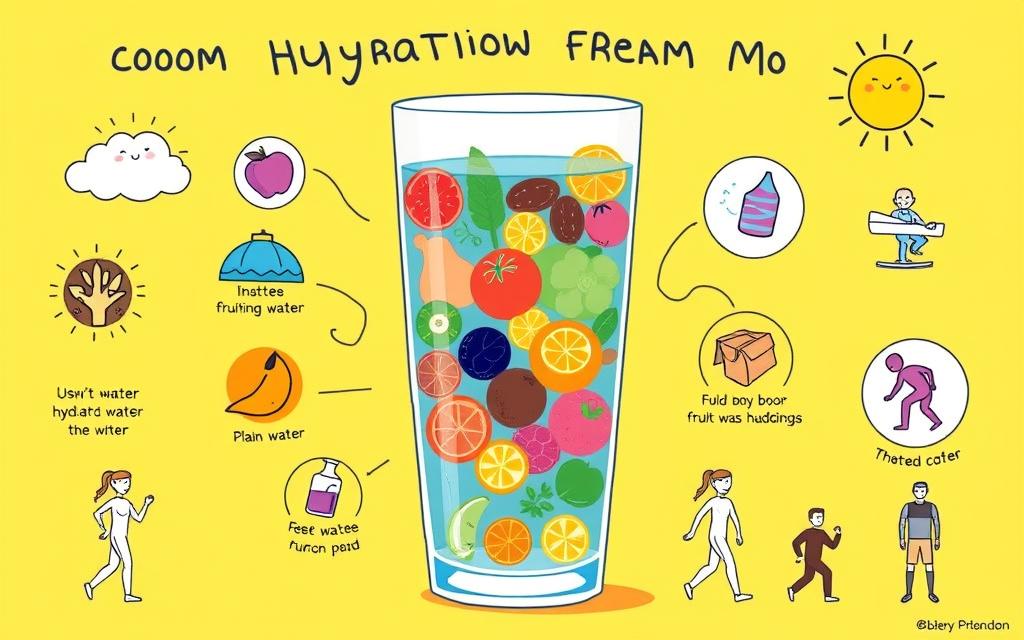
The Benefits of Staying Hydrated
Staying hydrated is key for our health and mind. The cognitive benefits of hydration are big, affecting our mood and thinking. Drinking enough water boosts our emotional health and brain function.
Boosting Mood and Cognition
Even a little dehydration can make us feel grumpy and tired. Studies show 75% of Americans don’t drink enough water, which hurts our mood and focus15. Drinking enough water helps keep our hydration and mood balanced, making us feel better emotionally.
Regulating Body Temperature
Drinking water is vital for hydration and temperature regulation. Our bodies are about 60% water, and keeping the right amount helps us stay cool when we’re active16. Without enough water, we risk getting sick from the heat, making it crucial to drink water, even when it’s hot17.
For example, a high school football player can lose a lot of sweat during practice. They need to drink about 5 pints of water to replace it17.
Improving Sleep Quality
Hydration and sleep are connected. Not drinking enough water can make it hard to sleep well. Drinking enough water helps us sleep better, with fewer wake-ups and better relaxation16.
Signs of Dehydration: How to Recognize Them
It’s important to know the signs of dehydration to stay healthy. Dehydration can show up in many ways, often with simple signs we should notice.
Thirst and Urine Color Indicators
Feeling thirsty is a key sign we need water. Another way to check if we’re hydrated is by looking at our urine. If it’s pale yellow, we’re good. But if it’s darker, we need more water.
Adults might feel dry mouth, tired, and really thirsty when they’re dehydrated. Older adults might not feel thirsty until they’re already dehydrated. So, it’s key to watch urine color to see if we’re hydrated18.
Other Symptoms of Dehydration
Other signs of dehydration include feeling dizzy, having headaches, and dry skin. Kids might get irritable, have fewer wet diapers, and dry mouth19. Spotting these signs early helps us drink enough water and avoid dehydration problems.
| Dehydration Symptoms | Indicators |
|---|---|
| Thirst | Feeling thirsty indicates a need for hydration. |
| Urine Color | Pale yellow means hydrated; dark yellow suggests dehydration. |
| Fatigue | Feeling unusually tired can signal dehydration. |
| Dizziness | Dizziness can occur as a result of insufficient fluid intake. |
| Dry Skin | Skin loses elasticity and feels dry when dehydrated. |
| Fewer Diapers (in infants) | Less than six wet diapers a day can indicate dehydration in infants. |
By knowing these signs, we can keep our hydration levels up and stay healthy20.
Staying Hydrated: Practical Tips and Tricks
It’s key to add better hydration habits to our lives. Knowing how to stay hydrated is crucial for our health. We can make drinking water and eating hydrating foods a part of our daily routine.
Incorporating Water into Your Daily Routine
Drinking a glass of water with each meal is a smart move. Carrying a refillable water bottle is another easy way to stay hydrated. Setting reminders on our phones to drink water every hour can also help.
Adults usually need about 64 ounces of water a day. This is roughly eight 8-ounce glasses21.
Hydrating Foods to Include
Eating foods rich in water can also help us stay hydrated. Adding foods like watermelon, strawberries, cucumbers, and leafy greens to our meals is beneficial. These foods are not only nutritious but also help keep us hydrated21.
| Hydrating Foods | Water Content (%) | Serving Size (1 cup) |
|---|---|---|
| Watermelon | 92 | 154 grams |
| Cucumber | 95 | 104 grams |
| Strawberries | 91 | 152 grams |
| Spinach | 91 | 180 grams |
By focusing on these hydrating foods and drinking plenty of water, we keep our bodies working well. Using these tips to track our hydration helps us feel great every day22.
The Importance of Water Intake for Athletes
For athletes, staying hydrated is key to better performance and avoiding dehydration. Dehydration of just 2% can really hurt performance in strength and endurance23. Sadly, about 66% of athletes start their practice dehydrated24. It’s important to know how much water we need, which changes based on our weight and activity level. Youth athletes should drink about ½ to 1 ounce of water per pound of body weight each day23.
It’s crucial to keep an eye on how much water we lose during exercise. Losing no more than 2% of body weight is recommended. For example, a 100-pound athlete should not lose more than 2 pounds during a workout23. Athletes should also drink back what they lose during exercise quickly. After working out, they should drink about 24 ounces of water for every pound lost23.
To figure out how much water we need, we can measure our weight before and after workouts. This helps us understand our hydration needs better23. If workouts last over an hour, sports drinks with carbs and sodium can be helpful25. These drinks should have between 110 to 240 mg of sodium per 8 ounces23. This helps replace lost electrolytes, which is important for long workouts.
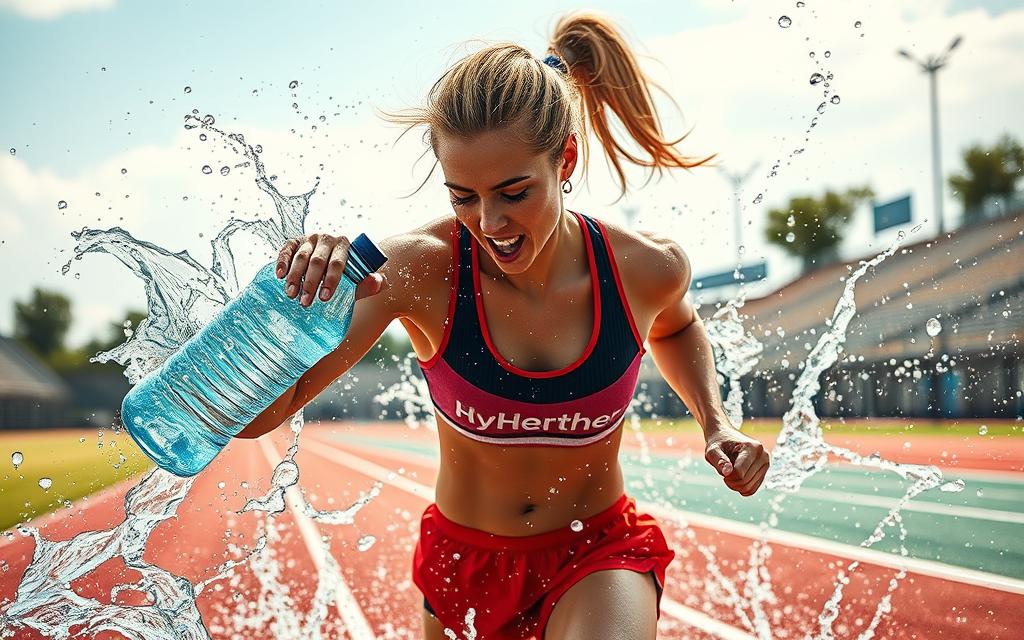
| Hydration Guidelines | Recommendation |
|---|---|
| Fluid intake before exercise | 500-600 ml (17-20 oz) 2-3 hours prior and 200-300 ml (7-10 oz) 10-20 min before24 |
| Fluid intake during exercise | 200-300 ml (7-10 oz) every 10-20 minutes25 |
| Fluid replacement post-exercise | 20-24 oz for every pound lost25 |
| Maximum weight loss during exercise | ≤2% of body weight23 |
In conclusion, knowing how much water athletes need is crucial for good performance. By following these tips, we can keep our bodies hydrated and ready for challenges.
Alternatives to Water: What Else Can Keep You Hydrated?
Water is still the top choice for staying hydrated. But, we can also try other healthy drinks to meet our fluid needs. Options like herbal teas, low-sugar fruit juices, and milk are great fluid intake alternatives. It’s important to avoid sugary drinks, as they can actually dehydrate us.
Choosing Healthy Beverages
There’s more to hydration than just water. For example, whole cow’s milk has about 87% water, making it a good choice26. Broth-based soups and gazpacho are also good, as they provide hydration and nutrients26. If you want something refreshing, try herbal teas with fruits or flavors that don’t add sugar.
Flavored Water and Natural Hydration Sources
Flavored water can make staying hydrated more enjoyable. Adding things like lemon, cucumber, or mint can make it taste better without sugar. We can also get hydration from natural sources like fruits and veggies. Zucchini and lettuce have about 95% water, and tomatoes and strawberries have similar amounts2726. Adding these to our meals not only feeds our bodies but also helps us stay hydrated in a fun way.
| Food Item | Water Content |
|---|---|
| Cucumber | 96% |
| Iceberg Lettuce | 96% |
| Local Cow’s Milk | 87% |
| Tomatoes | 94% |
| Strawberries | 92% |
| Broth-based Soup | Varies (primarily liquid) |
| Zoodles (Zucchini Noodles) | 95% |
By trying different drinks and adding foods high in water to our diet, we can improve our hydration27.
Over-Hydration: Can You Drink Too Much Water?
Hydration is key, but too much water can be harmful. Drinking more water than our kidneys can handle leads to hyponatremia. This condition is serious and can cause health problems if not treated.
Understanding Hyponatremia
Hyponatremia is dangerous. It can cause confusion, seizures, and even brain damage if not treated right. In extreme cases, it has led to deaths, like the 2007 case of a contestant who drank almost two gallons in two hours28.
Healthy kidneys can process about 1 liter of fluid per hour. But for athletes, like marathon runners, the risk is higher because they drink more29. Men should drink about 15 cups and women about 11 cups of fluid each day28. It’s important to know how much water we’re drinking to stay safe.
Managing Fluid Intake During Sports
For athletes, managing fluid intake is crucial. It’s recommended to drink 14-22 ounces of fluids two to three hours before exercise29. Also, about 20% of our daily fluid comes from food, which helps in planning our hydration28.
In extreme heat or high activity, we need to adjust our water intake. Following guidelines and monitoring our hydration helps avoid dehydration and over-hydration. This ensures we perform well without risking our health.
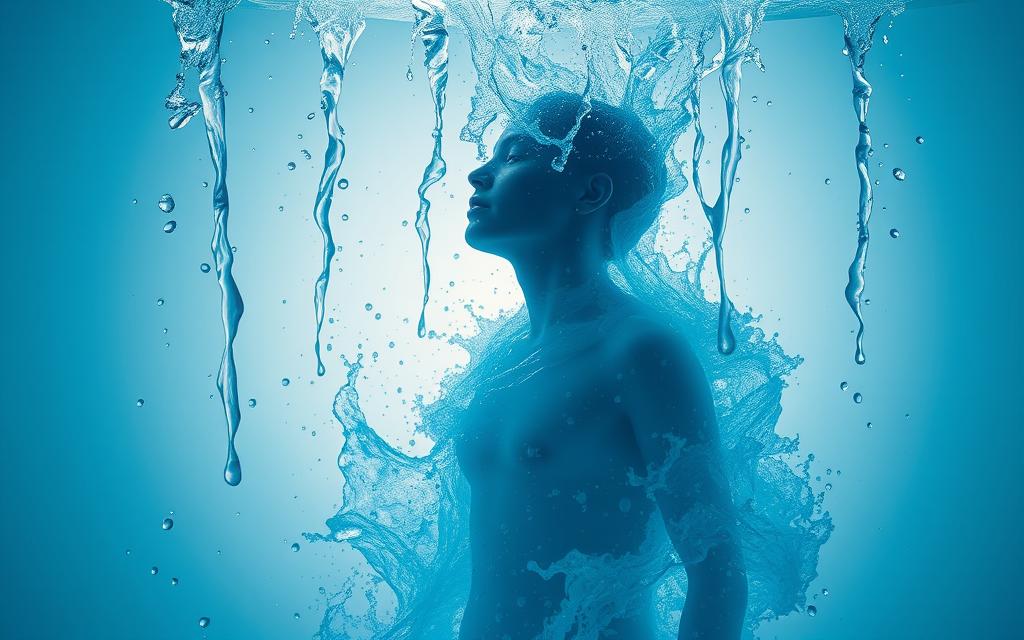
Special Considerations for Certain Populations
Our need for water changes at different stages of life and with health issues. It’s important to know how pregnant women, seniors, and those with health problems need to stay hydrated.
Hydration During Pregnancy and Breastfeeding
Women who are pregnant need to drink more water. Their bodies are changing a lot, and water helps keep them and their babies healthy. The National Academy of Medicine suggests pregnant women drink about 10 cups (80 ounces) of water each day.
For breastfeeding moms, they need even more water. They should aim for 13 cups (104 ounces) daily to stay hydrated while feeding their babies30.
Water Intake for Seniors
Seniors have special hydration needs because of their age-related changes. Dehydration affects 17% to 28% of older adults in the U.S31.. They might not feel thirsty as much and some medicines can affect their fluid balance.
It’s crucial for seniors to keep an eye on how much water they drink. This helps meet their hydration needs.
Considerations for Individuals with Health Conditions
People with health issues need to focus on their water intake. Conditions like diabetes or heart disease can affect how much water is right for them. It’s best for them to talk to their doctors about how much water they should drink.
Knowing how much water you need based on your health can help avoid dehydration31. It also helps keep you feeling your best.
Monitoring Your Hydration Levels
Knowing how much water we need is key to staying healthy. We can track our water intake by listening to our body’s thirst signals. When we feel thirsty, it’s a sign we need more water.
Looking at the color of our urine can also tell us if we’re drinking enough water. If it’s light, we’re good. But if it’s dark yellow or amber, we need to drink more32. There are also devices that track how much water we drink and how much we sweat. They give us tips based on our own habits and how active we are32.
When we’re working out, it’s important to drink the right amount of water. Adults should drink 6 to 12 ounces of water for every 20 minutes of exercise33. Athletes should also drink 16–24 ounces of water for every pound they lose during exercise33. Using apps like Waterlogged or iDrated can make tracking easier and help us stay on top of our hydration32.
Dehydration can really hurt our performance. It can make us slower, less flexible, and affect our mood33. By keeping an eye on our hydration, we can avoid headaches, muscle cramps, and even heat stroke33. Using water bottles with time markers can help us remember to drink enough water all day34.
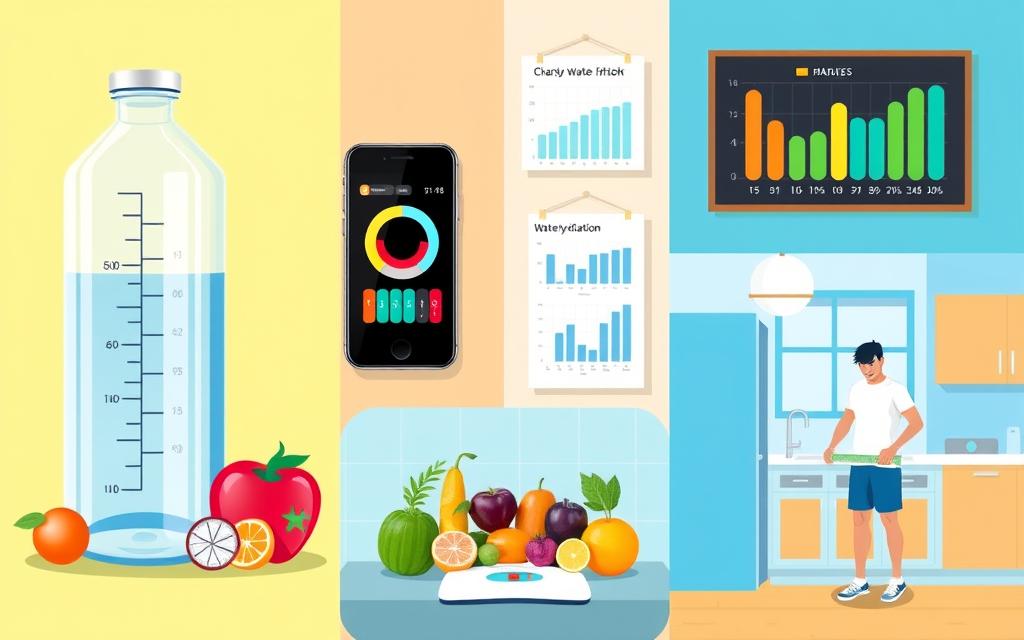
Conclusion
Knowing how important hydration is for our health is key. Water makes up about 60% of our body weight, showing its crucial role in our bodies35. It’s important to understand how much water we need each day. Adult men should drink about 3.0 liters, while women should aim for 2.2 liters3536.
By focusing on staying hydrated, we can avoid dehydration. This can cause tiredness and lower our brain function. Even a small amount of dehydration can affect our thinking36. So, drinking enough water is very important.
When we prioritize hydration, we do better in our daily tasks. We stay energized and support our health. By following these tips, we can live a healthier and more vibrant life.
FAQ
Why is hydration important for our health?
Hydration is key because water makes up 50% to 70% of our body. It helps every cell, tissue, and organ work right. Drinking enough water prevents health problems and keeps us feeling good.
How do I know if I’m staying adequately hydrated?
Check if you’re thirsty, look at your urine color—it should be pale yellow. Also, watch for signs like feeling tired, dizzy, or having a dry mouth.
How much water should we be drinking daily?
Men should drink about 15.5 cups (3.7 liters) of fluids daily. Women should aim for 11.5 cups (2.7 liters). This includes water and fluids from food, showing we need enough water.
What are the signs of dehydration I should look for?
Signs of dehydration include feeling thirsty, dark urine, tiredness, dizziness, headaches, and dry mouth. Spotting these signs helps us drink more water.
Can dehydration affect my mood and cognitive performance?
Yes, dehydration can make us feel grumpy and less sharp. It can cause irritability and affect our mood and focus. So, drinking enough water is important for our mental health.
What are some helpful tips for staying hydrated throughout the day?
Staying hydrated is simple. Drink water with meals, carry a water bottle, and set reminders. Also, eat foods with lots of water like watermelon and cucumbers.
How can athletes ensure they are properly hydrated?
Athletes should drink water before, during, and after exercise. Making a hydration plan based on their activity level helps avoid dehydration and improves performance.
Are there alternatives to plain water for staying hydrated?
Yes! While water is best, herbal teas and low-sugar juices can also help. Flavored water and soups can add to our hydration too.
What should I know about over-hydration?
Drinking too much water can lead to hyponatremia, a dangerous low sodium level. It’s vital to watch how much we drink to stay safe.
How do specific populations, like pregnant women or seniors, need to consider hydration?
Pregnant and breastfeeding women need more fluids for their health and baby. Seniors have special hydration needs due to age-related changes. It’s important for them to drink enough water regularly.
